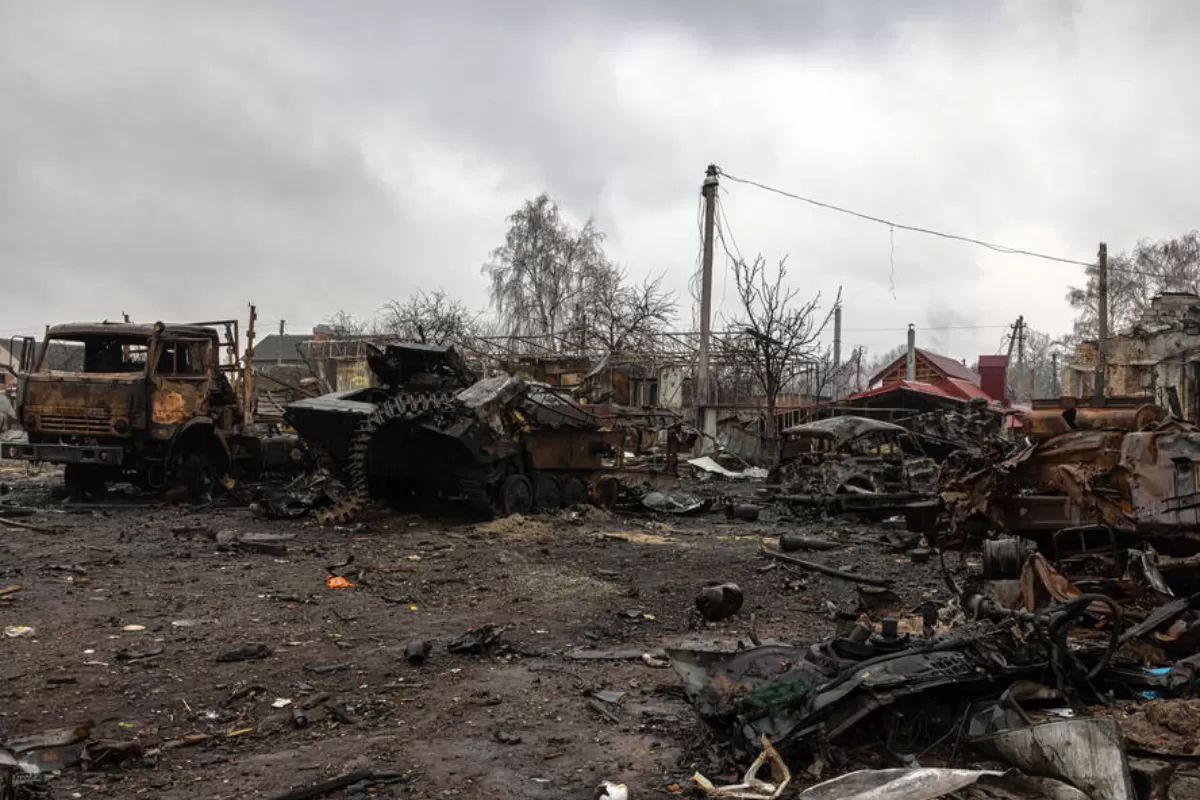
The war had a powerful impact on the perception of Ukrainians, something which has been confirmed by opinion polls published after February 24. From a politician with plummeting numbers, Volodymyr Zelensky’s approval rating has now reached unbelievably high levels. Russia is now hated by most Ukrainians, who also distance themselves from the Moscow Patriarchy
Nine in ten Ukrainians hate Russia, and 98% of them consider it their enemy
In January, half of Ukrainians considered Russia to be their enemy. Most negative feelings were tied with the annexation of Crimea and the war in Donbas. 37% of citizens believed the Russian military build-up on the Ukrainian border is a bargaining chip for Russia in its talks with the West in order to prevent Ukraine from joining NATO and to obtain certain “security guarantees”. Therefore, Russia was not well regarded, but nor was there an overarching hostility towards it.
After February 24, the day the Russian army started the war, the situation turned around. In mid-March, 88% of Ukrainians said they hated Russia.
Hostility towards Russia is soaring in most regions of Ukraine and across all linguistic and national groups, according to a study conducted by Gradus Research.
To 98% of Ukrainians, Russia is the enemy of their country, just as Belarus (84%). The study conducted by Rating group on March 20 shows that people who doubted Russia would attack, now think otherwise. The war persuaded them that forecasts about “the imminent war” were not just empty media hype.
The destruction of cities and villages, the women and children who were killed, the attacks on civilian objectives, have all radicalized society and further cemented national identity.
The same survey shows that Ukrainians consider nations such as Poland, Lithuania, the United Kingdom and the United States to be friendly. China is seen as a neutral state, and the attitude towards Romania has definitely improved.
Ukrainians believe victory is at hand
On February 27, after 3 days of fighting, 70% of Ukrainians believed the Ukrainian Armed Forces will succeed in defending the country, whereas Russia’s attack will be fended off. 16% of Ukrainians were skeptical, saying the resources of Ukraine and Russia are disproportionate.
The resistance mounted by Ukrainians during the war with Russia has become a factor for consolidating confidence in the army and in people’s capacity of defeating the aggressor.
On March 3, 88% of Ukrainians already declared Ukraine will win whereas only 10% of the population didn’t believe in victory. On March 20, 93% of Ukrainian citizens were already confident Ukraine would prevail.
In conjunction with this surge of patriotism, expectations regarding the outcome of the war also increased. Ukrainians no longer want to sue for peace at any cost, but want a “just peace”. Most Ukrainians said they would not sign a peace agreement with Russia until Moscow withdraws all troops from the territory of Ukraine.
On the one hand, such civil attitudes help Kyiv achieve its defensive tactical goals. On the other hand, they represent a problem for the Ukrainian elites, which find themselves in a predicament. The elites know expectations run high, but they also understand resources are limited, and there are many issues left unsolved.
Due to the invasion, the Moscow Patriarchy is losing its priests and parishioners in Ukraine
A survey published on March 10 reveals that half of the parishioners of the Ukrainian Orthodox Church, which is subordinated to the Moscow Patriarchy, want to sever ties with Patriarch Kirill. Only 10% of Ukrainians have argued against the move, while the rest remain undecided.
In this context, the Rada is debating a bill on banning the Ukrainian Orthodox Church. An increasing number of clergymen have stopped invoking Patriarch Kirill during mass, while some parishes have severed all contacts with the Patriarchy of Moscow after the latter blessed Russia’s war against Ukraine.
Ukrainians are blaming the Russian Orthodox Church for backing the war in ideological terms and hate Russia for its aggression in Ukraine. In this context, 90% of Ukrainians believe Moscow will pay reparations after the war and all buildings and roads in Ukraine will be renovated with Russia’s money. Meanwhile, 66% of respondents support the idea of Zelensky-Putin direct negotiations in order to end the war.
Volodymyr Zelensky – a free-falling statesman turned European leader
Zelensky’s rating was in free fall in 2021. In December, merely 33% of Ukrainians said they would vote for Zelensky in the upcoming election. The scandal surrounding the trial of former president Petro Poroshenko did little to boost Zelensky’s popularity.
Two days before the war, 41% of Ukrainians said they trusted Volodymyr Zelensky, whereas 57% claimed they no longer trust him.
On March 3, however, 93% of Ukrainians said they support Zelensky and trust his decisions to get the country out of the war. Volodymyr Zelensky continues to be the best-rated Ukrainian statesman, especially after he decided not to leave Kyiv.
How war changes society
The war has shown the extent to which partisanship and conflicting views can be turned around at society level: some disappear while others are deepened. Breaking ties with the Patriarchy of Moscow seemed impossible a month ago, but the Russian-Ukrainian war accelerated the process. Zelensky’s popularity skyrocketed. Peace at any cost is no longer an objective for Ukrainians. At the same time, confidence in Western countries also went up, while Romania became a trusted friend of all Ukrainians. It remains to be seen just how far this change will go and if it continues after the war as well.


